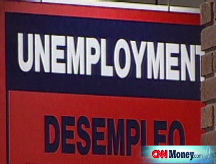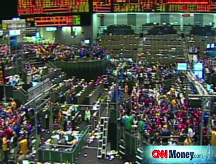Dollar mixed after bailout
U.S. currency in flux after House approves historic financial intervention.
NEW YORK (CNNMoney.com) -- The dollar was mixed Friday after the House approved a massive intervention in the nation's financial system.
At 4 p.m. ET, the euro traded at $1.3805, down from $1.3844 late Thursday in New York.
The 15-nation currency rose to $1.3878 just before the legislation was passed. But it quickly retreated after the vote.
The dollar edged up against the Japanese yen to ¥105.16 from ¥105.06. And the British pound was quoted at $1.7752, up from $1.7686.
House lawmakers passed a sweeping $700 billion rescue package aimed at bailing out the financial system. The plan seeks to stabilize the U.S. economy by ridding the market of illiquid assets that have crippled the banking sector.
The news reversed gains on the stock market as investors took a "buy the rumor, sell the news" reaction. And credit markets remained frozen.
Investors are "cautiously optimistic" about the plan's ability to succeed, said Steve Malyon, currency analyst at Scotia Capital in Toronto.
The landmark legislation is only "the first step down a long road" and there is "considerable uncertainty" about how it will work and how effective it will be, Malyon said. "That's probably why we're not seeing a more dramatic move."
Labor market weakness. The government's monthly jobs report highlighted the challenges facing the U.S. economy.
The Labor Department reported Friday that the nation's economy had a net loss of 159,000 jobs in September, the ninth straight month of job cuts, according to the Labor Department. The August job loss was revised to 73,000 jobs from 84,000. Year-to-date, the U.S. has shed 760,000 jobs.
Economists surveyed by Briefing.com had expected the government to announce a nationwide loss of 105,000 jobs for September.
The unemployment rate was unchanged at 6.1%, in line with estimates.
Friday's jobs report was "very bad," said Ashraf Laidi, currency market analyst at CMC Markets in New York. "It reflects marked deterioration in the real economy."
The ongoing weakness in the labor market has prompted speculation that the Federal Reserve will lower its benchmark interest rate at its Oct. 28-29 meeting.
Market turmoil overseas. The euro came under pressure this week amid increasing strains on the European economy.
On Thursday, the 15-nation currency fell to a one-year low of $1.3746, after the European Central Bank hinted that interest rates may come down.
Meanwhile, the turmoil in Europe's banking sector continued Friday with Swiss bank UBS announcing it will cut an additional 2,000 investment banking jobs, bringing the total headcount reduction to 6,000 over the past year.
Also on Friday, France's national statistics agency said the country has tumbled into a recession, with economic growth expected to contract over the next six months.
The Insee statistics agency said it expects France's economy to shrink by 0.1% in both the third and fourth quarters. Following on a 0.3% fall in the second quarter, that would bring growth down to 0.9% for 2008. ![]()




